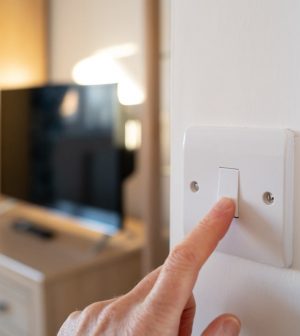- Could Your Grocery Store Meat Be Causing Recurring UTIs?
- Are You Making This Expensive Thermostat Error This Winter?
- Recognizing the Signs of Hypothyroidism
- 10 Strategies to Overcome Insomnia
- Could Artificial Sweeteners Be Aging the Brain Faster?
- Techniques for Soothing Your Nervous System
- Does the Water in Your House Smell Funny? Here’s Why
- Can a Daily Dose of Apple Cider Vinegar Actually Aid Weight Loss?
- 6 Health Beverages That Can Actually Spike Your Blood Sugar
- Treatment Options for Social Anxiety Disorder
Bright Light at Night Could Raise Odds for Diabetes

Want to reduce your risk of type 2 diabetes? Avoid bright light at night, a recent study suggests.
More exposure to light at night, between 12:30 a.m. and 6 a.m., is linked to a higher risk of developing type 2 diabetes, researchers found.
That’s likely because light affects sleep patterns, which are important for maintaining healthy insulin sensitivity and stable blood sugar levels, researchers said.
“Light exposure at night can disrupt our circadian rhythms, leading to changes in insulin secretion and glucose metabolism,” senior researcher Andrew Phillips, an associate professor of medicine and public health at Flinders University in Australia, said in a news release.
“Changes in insulin secretion and glucose metabolism caused by disrupted circadian rhythms affect the body’s ability to regulate blood sugar levels, which can ultimately lead to the development of type 2 diabetes,” he continued.
For the study, researchers analyzed data from about 85,000 healthy people without diabetes.
The participants wore devices on their wrist for one week that tracked their light exposure levels day and night, collecting about 13 million hours of light sensor data.
The team then tracked the participants for nine years to see whether they went on to develop type 2 diabetes.
They found a higher risk of type 2 diabetes for people exposed to light at night, even after accounting for other factors like lifestyle, sleep patterns, shift work, diet and mental health.
What’s more, the effect was dose-dependent – higher levels of brighter light caused diabetes risk to increase more.
“Our findings suggest that reducing your light exposure at night and maintaining a dark environment may be an easy and cheap way to prevent or delay the development of diabetes,” Phillips said.
The new study was recently published in The Lancet Regional Health-Europe.
More information
The National Institutes of Health has more on sleep and diabetes risk.
SOURCE: Flinders University, news release, June 25, 2024
Source: HealthDay
Copyright © 2026 HealthDay. All rights reserved.










